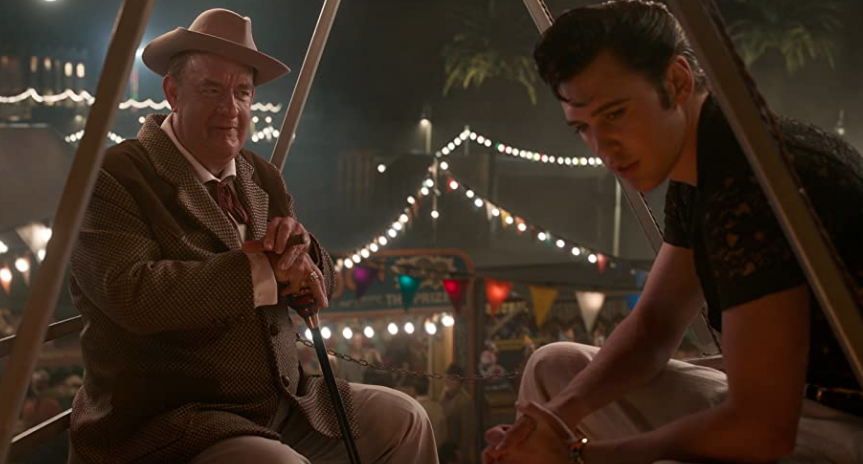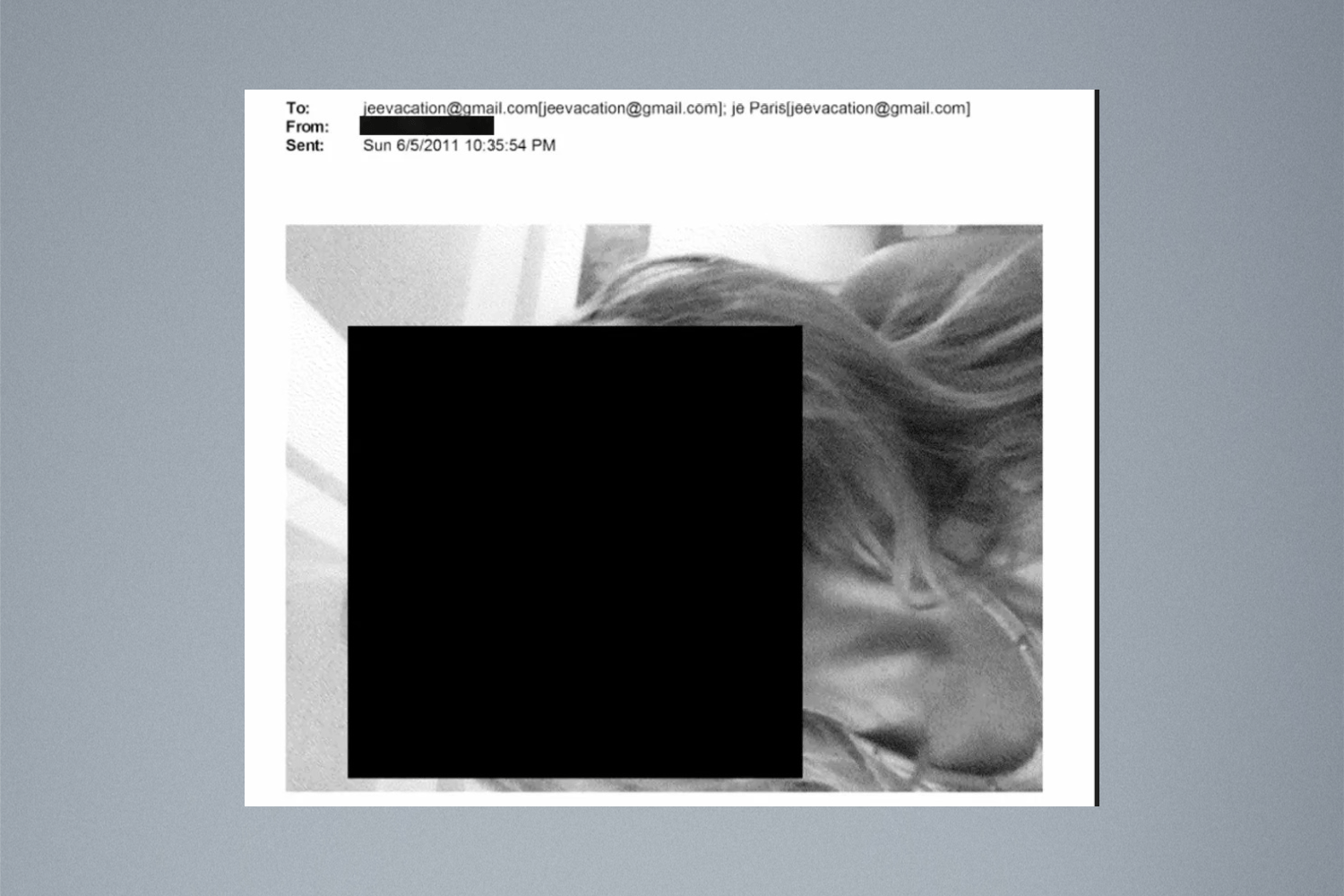Baz Luhrmann always seems like a good idea. Elevating doomed, rapturous romanticism with IMAX-ready swoops and hyper-edited rhythms, the Aussie auteur also chooses seemingly ideal subjects upon which to impose his garish, wide-eyed delirium. Shakespeare. Puccini. Fitzgerald. And now, ladies and gentleman [cue “Also Sprach Zarathustra”], the King of Rock ’n’ Roll himself, Mr. Elvis Presley.
Too bad about the actual movies though, huh? Neither warm enough for kitsch nor funny enough for camp, they do so much and achieve so little. The notes their set pieces hit are typically a little sharp, resulting in an uncanny valley effect. Luhrmann’s style theoretically complements his stories, but their flashy, belabored mess is like the brother of a celebrity you can’t stop seeing as just the wrong version of his famous sibling. Sometimes bad taste just tastes bad.
In taking on the most successful master of excess in American popular music history, Elvis inadvertently highlights what Luhrmann’s aspirations to maximal tackiness have always lacked: an honest, inspired vulgarity. Elvis begins with one of those exercises in attention deficit direction that so tickles Luhrmann fans: plunging syringes become roulette wheels become spinning 45s; screens split, then divide again, like media overload as metastasis; the soundtrack layers burbling voiceovers and sonic anachronisms and a dub-like “Suspicious Minds,” the film’s musical and thematic motif.
It’s all razzle and no dazzle, and if the King had caught this on late night TV he'd have reached for his .357. One admirer dubbed Elvis Speed Racer Amadeus, which is very clever and somewhat accurate and unfair to the Wachowskis’ visually assaultive live-action anime. It’s the difference between riding a roller coaster and watching someone else ride one.
A cynical observer might suspect that Elvis is a Hail Mary from Elvis Presley Enterprises (who sought out Luhrmann’s services) to juice the King’s catalog with their own Bohemian Rhapsody before his last living fan dies. Whatever Baz is though, he’s no cynic. His commitment to the sensational, though often self-aggrandizing, misguided, and just plain unfun to behold, is earnest. He may well believe his overkill is capable of generating what Werner Herzog (whenever his own documentaries are caught fibbing) calls “ecstatic truths.” I can’t imagine Elvis is exactly what the King’s accountants ordered: We rarely get to enjoy a full musical number, or linger over Elvis’s music at all. In fact, I walked out humming “A Fool Such as I,” performed several times in the film by Hank Snow (Chris Isaak), who embodies the square country-western world Elvis challenged. That couldn’t have been the plan.
Luhrmann’s thesis—and underneath all its visual three-card Monte, Elvis is didactic enough to deserve that bookish word—is that Elvis Presley’s career was a love triangle between the star (a suitably yummy Austin Butler), his lifelong manager, Colonel Tom Parker (a grotesquely miscast Tom Hanks, who unfortunately also narrates), and the millions of devoted fans that, as the old promo campaign had it, can’t be wrong. The tension between Elvis’s carefully studied knowledge of what his admirers needed from him and Parker’s cynical one-size-fits-all carny worldview—between “the showman” and “the snowman,” as the script would have it—is what drove Elvis to the heights of fame and ultimately undid him. In Luhrmann’s telling, Parker wins every battle during Presley’s lifetime, consistently outmaneuvering his client. But Elvis wins eternity, because he is forever.
Is he though? If the lane for a 21st century retelling of the Elvis fable feels wide open, that’s because the once-pivotal figure has largely lost cultural resonance, even as an object of ridicule—nobody rebels against their grandparents’ music. The pink Cadillac that is Elvis’s life has been long since scrapped for parts. His last big moment, such as it was, came when the soundtrack trifle “A Little Less Conversation,” remixed for a Nike ad, became an unexpected hit in 2002—a particularly anticlimactic coda to the 20th century and the rock and roll era. Elvis can feel as distant from us as Sinatra, if not Bing Crosby.
For sure, no one under 30 can imagine how utterly inescapable Elvis was for the quarter-century after his death in 1977. When Lester Bangs’s obituary declared “we will never again agree on anything as we agreed on Elvis,” the hyperbole was emotionally true enough to be forgivable; Mojo Nixon’s “Elvis Is Everywhere” was just a statement of fact. Elvis seeped through the cracks in our culture, resurfacing in dog food commercials and supermarket tabloids. He was sighted regularly across America like some mix of Jesus and Bigfoot. You absorbed Elvis lore, trivia, and arcana without trying, the same way you learned a Big Mac’s ingredients or the words of “The Star-Spangled Banner” or your phone number.
Elvis’s life in the ’70s, except to the truly devout, was a lurid joke. At best, admirers saw his life as a parable about the wages of fame or commerce. At worst, he offered a cynical lesson that youthful rebellion ends in drug-addled constipation, a version often tinted with snide classism. However you told the tale, it was shot through with a particularly American fatalism: Elvis was dead before he died.
But times change, and schmaltz, schlock, bombast—you know, the standard showbiz stuff that, the story went, rock ‘n’ roll kicked to the curb—has triumphed over the idea that a good backbeat and a jolt of electrified musical miscegenation could change the world. The King’s ornate capes are far more distinctive now than (yawn) a white kid singing Black music. Yeah, you can probably still find some rockabilly collector who’ll die contending that Presley’s career went downhill when he hired a drummer. But why should anyone approaching his life for the first time care about such ancient quarrels?
So Luhrmann can confidently treat Presley’s debut at the International Hotel in Las Vegas in 1969 as a career peak, the logical next step after his TV comeback special redeemed him in the eyes of his people a year earlier. After all, a Vegas residency, once deemed the height of capitulation to dull adult consumerism, is now on every pop star’s bucket list. Rather than splitting Elvis into the standard Before and After versions (a young rebel forever chastened by his army stint) Luhrmann makes the case that Presley was true to his own aesthetic throughout his life, that his operatic take on Black gospel and his hillbilly R&B were both of a piece. (Though his almost exclusive focus on Elvis's Black inspirations, deemed essential for dramatic purposes, shortchanges Elvis the Mario Lanza and Dean Martin fan, and even his country roots.)
Yes, Elvis is wheedled into the hotel gig by the infernal Colonel, to pay that villain’s gambling debts. But the Elvis who carefully coaches each element of his huge Vegas ensemble—strings, horns, two sets of backup singers—to perform “That’s All Right, Mama,” is clearly the captain of his own speedboat. The maximalist vision taking shape reminded me of Tom Smucker’s description of “True Schlock music” in this still-revelatory 1976 Anne Murray review for the Village Voice. (Incidentally, Elvis loved Murray’s stuff.) Schlock, Smucker wrote, is the sound of have-nots encountering abundance for the first time, too enraptured with their good fortune to worry about silly details like taste. “True Schlock music uses every sound available because it’s thrilling,” he explained, “without worrying about what would be appropriate.”
Luhrmann couldn’t have made it past the starting line without Butler, who meets the first criterion of any screen Elvis: He can totally get it. Butler’s face does lack some of what made Elvis sensuous as well as sexy. His gaze pierces where Presley’s invitingly fluffed the comfy pillows of his lids; he also lacks the young Presley’s baby fat, that suggestion of indolence so key to his allure, hinting that “Baby Let’s Play House” also meant sleeping in the next morning. But none of that’s a criticism. Rather than impersonating Elvis (surely a terrible choice when there are already so many lifelong pros) Butler plays the version of Elvis the film calls for, and rises above his surroundings in the process. His Elvis knows what he wants and possesses laser-sharp pop instincts. He's often out-strategized and eventually defeated, but you don't feel like what happened to him had to happen, and that's a real achievement.
Unfortunately, Butler faces off against what I’d call the worst performance of Tom Hanks’s career if I didn’t have to watch Cloud Atlas to confirm. Prosthetically plumped and disfigured to resemble a Spitting Image puppet of LBJ, Hanks’s Colonel Tom Parker, the Dutch enigma whose schtick rested on his fabricated image as a good ol’ American huckster, talks like a made-for-TV Blofeld. Christ, his son does better accents. It’s a performance smart-ass teens should be mocking for years to come.
If time has done Luhrmann the favor of stripping away the gunk that made Elvis impossible to appreciate on his own terms—the expectations, the misinterpretations, the projections, the prejudices—the director still has a not-necessarily-receptive audience to introduce him to. So much that was up in the air in 1956—so much that Elvis himself tossed up into the air—is now supposedly a settled question. “We” now “know” that cultural appropriation is theft, that the American dream is a fraud, and that the lifecycle of fame has its own exhilarating and depressing rhythms. Guess part of being Elvis is never quite having your own terms to be appreciated on.
Luhrmann tackles the race question with elaborate special pleading and flamboyant ass-covering. A Chuck D diss and a fabricated quote die hard, so Luhrmann labors not just to demonstrate Presley’s love for Black music (which no serious person has ever really doubted) but to insist on the reciprocity of that love. Moving freely from the shacks and revival tents of Tupelo to the hot clubs of Beale Street, Elvis, we’re made aware, was perpetually invited to the cookout. As biography, mostly true. As a guide to Elvis’s music, arguably pertinent. With regard to the long, tangled history of race in American popular music, barely relevant. As cinema, klutzy as fuck.
Maybe an ever bigger challenge is how to dramatize the singular nature of Elvis’s fame onscreen. We’ve seen prim bobbysoxers suddenly lose their shit in synchronized orgasm at the first hip-wiggle too many times before. What’s more, stardom, fandom, and even outrage have been so thoroughly ritualized it’s hard to recognize them as the shocking novelty they once must have been. Good thing that Butler effectively conveys just how fucking weird Elvis was. With his greasy, blackened hair, sloppy eyeliner, and baggy pink pants, this boy fits in at the Louisiana Hayride like a Juggalo at a Federalist Society meeting. His gyrations, a freak variant of the Black culture he’s osmosed since birth, are the most dangerous kind of sexy: the silly kind, where what’s forbidden isn’t just dirty but fun.
Though Luhrmann respects Elvis as an artist, he's more interested in him as a spectacle than a singer—could any chronicler be less concerned with Elvis reconfiguring the DNA of American pop in Sun Studios in 1954? And fair enough, that ground’s been well-covered. Still, some acknowledgment is due that even the girls who couldn't make it to his concerts listened to his records alone in their rooms and responded to his voice. Take the footloose and playful "Don't Be Cruel," maybe the pinnacle of that great genre of "flirty Elvis," which falls between the heavy-breathing ballads like "Love Me Tender" and the in-the-red rockers like "Hound Dog." You're kidding yourself if you don't think the way he cutely drawled "Baby it's just you I'm" before dropping down low to "thinking of" didn't cause as many unexpected sensations as his hips did.
Elvis consistently devises imaginary dramatic clashes to illustrate Great Truths. Following an infamously demeaning appearance on The Steve Allen Show, where Elvis was encased in formalwear and had to sing “Hound Dog” to an actual pup, Elvis rebels against against Col. Tom’s plan to domesticate him into a family-friendly “New Elvis.” He strikes back at his next performance with a galvanic, riot-instigating “Trouble” (impressively, two years before it was written). if you don't grasp the cultural significance of a white southern kid hornifying good white girls in the '50s by singing Black music, Luhrmann intercuts a speech from a nearby Klan rally. Dude. We. Get. It.
Perhaps the most ridiculous sequence concerns Elvis’s 1968 televised comeback special. Dangerous in black leather, ripping through a ferocious rock ‘n’ roll set and then debuting the massive inspirational ballad “If I Can Dream” to honor the recently assassinated Martin Luther King, Presley instantaneously erased memories of the hack movies he barely woke up to film over the past eight years. But Luhrmann pretends Elvis somehow concocted this spectacle while convincing the Colonel he was working on a Christmas special instead. Fudge history all you want, man, but you gotta be credible. And so what’s likely to be the last cinematic word on Elvis Presley’s life surrenders a large chunk of its screen time to Tom Hanks angrily stomping around and demanding a staged rendition of “Here Comes Santa Claus.”
I know, I know, historical accuracy hardly matters in this whiz-bang fantasyland, and even the obligatory fact-check pieces about Elvis have been a little sheepish about carrying out their duties. Still, you don’t have to rub it in. In one scene, as Elvis recuperates in a hospital bed, the news breaks simultaneously of Altamont and the murder of Sharon Tate, events that occurred four months apart. Dr. Nick’s drugs can’t be that strong. I half-expected Priscilla to somberly say “The Sixties are over.”
Oh yes, Priscilla, a role which Olivia DeJonge does as much with as she can between emitting obligatory protests like “I’m your WIFE, Elvis!” or angrily knocking a shelf of pill bottles to the floor. (So many great looks though, which doesn’t not matter.) When Presley is drafted and shipped to Germany, we are introduced to the future Mrs. Elvis as the “teenage” daughter of an Army officer, which is not strictly untrue but is also a whole lot less true than calling her the “14-year-old” daughter of an Army officer. The rest of Presley’s sex life is similarly airbrushed. Even if you don’t believe reports that he hooked up as much to win women’s approval as to shoot his load, Elvis certainly developed more hangups than the typical touring stud we see occasionally rutting here.
Even by the cliché-ridden standards of the music biopic, Elvis Walks Hard. No major world event happens without a TV in the room. When someone first mentions Sam Phillips, someone else condenses his Wikipedia entry for the audience. This goes beyond tell-don’t-show laziness. Luhrmann clearly doesn’t trust his source material or his audience or maybe even his own ability to coherently depict what’s happening onscreen without a tedious explanation. Occasionally he pulls off a shameless, on-the-nose scenario, like Elvis and the Colonel signing their first pact while stuck atop a Ferris wheel. But when the word “geek,” painted on a sideshow tent, comes suddenly and sharply into focus behind Elvis, I wanted someone to bite off Luhrmann’s head. After Elvis shouts at his mother and she leaves the room in tears, his girlfriend Dixie helpfully exclaims “Elvis! You made your mama cry!” This isn’t dialog—it’s Alt Text.
Which brings us to the film’s most damning conceit: using the Colonel as narrator, which probably wouldn’t have worked even if Hanks didn’t sound like Col. Klink trying to pass as Col. Sanders. Does Luhrmann secretly fret that he himself is more snowman than showman? Or is he just the kind of mark who gets duped by his own unreliable narrator?
There's a quaint charm to Luhrmann’s fascination with American myth, an untimely obsession as the nation’s failings feel more like bitter jokes than heroic tragedies. But as with his last overcooked adaptation, The Great Gatsby, Luhrmann implies that his taste in excess deserves respect because his doomed hero’s does too, never realizing he's got more in common with his compromised narrator. For Luhrmann, Elvis is Gatsby with guitars, narrated by a sinister Meyer Wolfsheim rather than a clueless Nick Carraway. Presley yearns for the adulation of the masses instead of a single Daisy Buchanan, and in striving to make himself worthy brings about about his own destruction. So Elvis beats on, a private jet against the current, caught in a trap, because he loves us too much baby.
Elvis is playing in area theaters.






